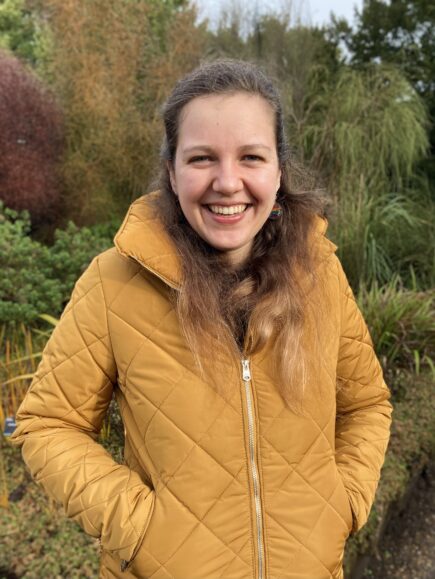
It’s not unknown for research topics to acquire greater contemporary resonance over the course of a PhD. But for Alina Utrata, the past few months have seen her interests go from niche to era-defining.
“I look at the political theory of tech companies,” she explains. “When I started, people were like ‘Elon Musk, who’s he?!’”
As a subject, it’s close to home. Alina grew up in Silicon Valley, and attended Stanford as an undergraduate, majoring in History with a minor in Human Rights. She was awarded a Marshall Scholarship to study at Queen’s University, Belfast, where she completed an MA in Conflict Transformation and Social Justice.
“I was in Belfast when the Cambridge Analytica stuff started happening, and there started to be reflection on the part of Silicon Valley. I was away, watching my friends who are part of the tech industry and this community I’d grown up with re-evaluate their own role in the world and whether they really are political and how they affect politics.”
At the time, the industry appeared solidly left-leaning, a transformation which Alina has witnessed from a distance while completing her PhD at the Department of Politics and International Studies (POLIS).
“It’s been interesting to study my home from afar,” she says.
Alina came to Cambridge as a Gates scholar, having returned to the United States after her studies in Belfast while deciding on the next stage of her academic career.
“I was trying to figure out law school versus a PhD, and then ultimately decided on a PhD and went back to the States for a year or two in between. And then, because I wanted to do a qualitative, theoretical kind of politics degree, Cambridge – and POLIS – was really the place to do it.”
Darwin was central to her Cambridge ambitions from their inception.
“One of my advisors at Stanford, David Cohen, had gone to Darwin for his PhD. Moses Finley (American classicist and Master of Darwin from 1976-82) was his supervisor, and when David asked what College he should apply to, Moses told David Cohen ‘you will come to Darwin’. And so David Cohen said unto me ‘you will go to Darwin’! So every time I see Moses’s portrait in the Dining Hall I think ‘this is the trajectory of why I’m here’.”
Alina proved more than worthy of the lineage, winning POLIS’s Lisa Smirl Prize for the best PhD thesis of 2024 for her dissertation Silicon Valley and the State: Towards a Political Theory of Technology Corporations. And the College proved the right fit.
“It was definitely the right choice – no regrets! It was so lovely and friendly and welcoming, it felt like such a home. And I love the history of it. I’d read Gwen Raverat’s memoirs, where she talks about growing up in the house, so I love the layered history of it, but it’s also so cosy, safe and warm.”
She is now a Research Fellow at St John’s College, Oxford, where she is continuing her research into the political power of tech corporations.
“I have the Career Development Research Fellowship, which was previously the Junior Research Fellowship. So it’s really nice, because I get to focus on my own research.”
That research currently involves working on a book on Elon Musk, Jeff Bezos, and the colonisation of outer space.
“I’m also thinking about how we can democratise corporations, how we can keep them in check. How do we make sure we have this kind of vibrant ecosystem of all sorts of corporations, like universities for instance, that are established for and governed by some sort of social good or collective purpose? And governed collectively rather than dictatorially where, you know, Mark Zuckerberg can tell you what to do.”
Thinking about how to conceptualise technology corporations as political actors is perhaps an easier academic pursuit to explain than it was when she started out.
“In 2016 this was a harder pitch than it is today. In 2025, everyone’s like ‘yeah, definitely’!”
Alina will graduate this weekend with a PhD in Politics and International Studies.
